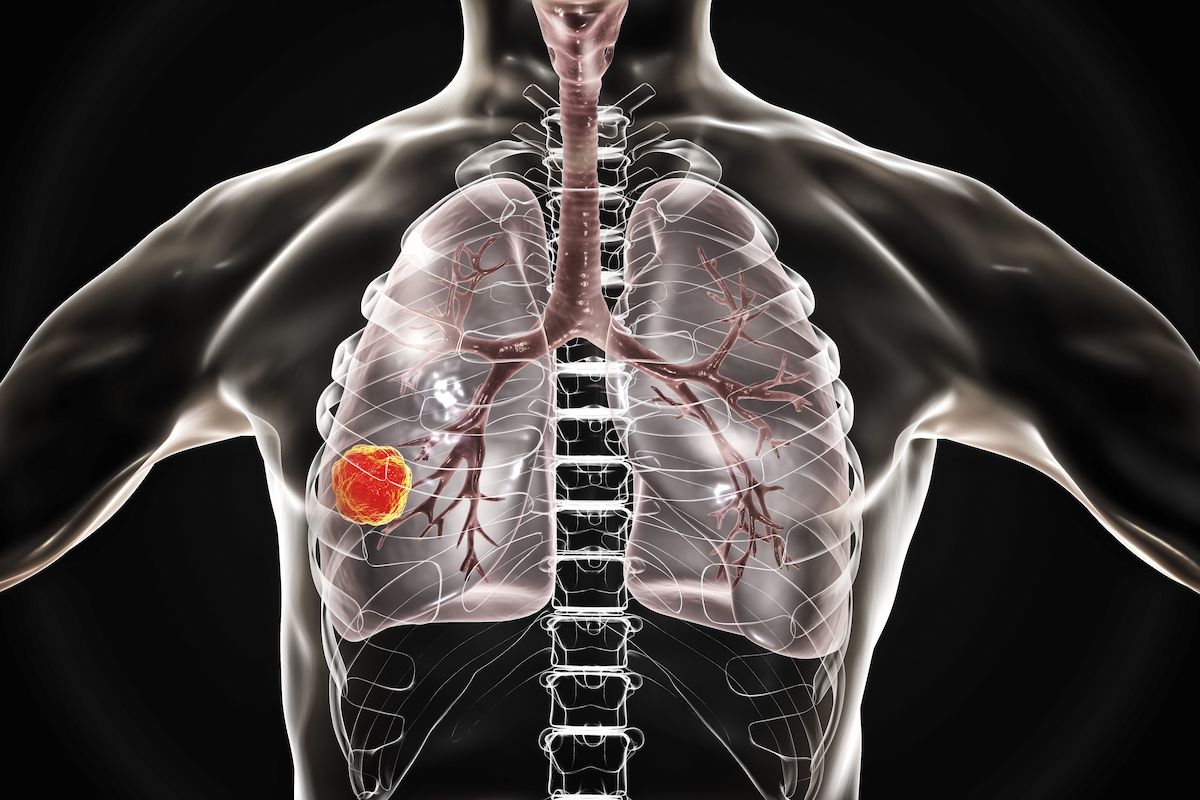THIO/Cemiplimab Shows Significant Disease Control in NSCLC
Results from the phase 2 THIO-101 trial demonstrate disease control in all 19 patients with non–small cell lung cancer who received second-line THIO plus cemiplimab.
THIO-101 is the first study to evaluate the drug’s anti-tumor activity when combined with anti–PD-1 agent cemiplimab.

THIO (6-thio-dG) plus anti–PD-1 therapy cemiplimab-rwlc (Libtayo) produced positive activity in patients with non–small cell lung cancer (NSCLC), according to a press release on data from the phase 2 THIO-101 trial (NCT05208944) from MAIA Biotechnology.1
Results from the trial showed a preliminary disease control rate (DCR) of 100% (n = 19/19) as second-line treatment and 88% (n = 14/16) as third-line treatment. These rates met statistical requirements quicker than expected, allowing investigators to initiate the next stage of the trial.
“In patients [with NSCLC] who received at least one line of therapy, DCRs have shown to be excellent predictors of overall survival [OS],” study author Vlad Vitoc, MD, chief executive officer at MAIA Biotechnology, said in the press release. “The results are even more remarkable given patients in this population have previously [progressed on]treatment with a checkpoint inhibitor...These exceptional preliminary results underscore our confidence in advancing the trial to bring our novel treatment to [patients with] advanced stage NSCLC.”
This multicenter, open-label, dose finding, randomized phase 2 trial consists of patients with advanced NSCLC who progressed or relapsed after first-line treatment including an immune checkpoint inhibitor (ICI) with or without chemotherapy. The primary endpoints of the study are the safety and tolerability of THIO as a priming dose, overall response rate (ORR), and DCR. Secondary end points include duration of response, progression-free survival, and OS.
THIO-101 is the first study to evaluate the drug’s anti-tumor activity when combined with anti–PD-1 agent cemiplimab. Part A of the trial assessed safety through the enrollment of 10 patients who received 360 mg of THIO intravenously followed by 350 mg of cemiplimab every 3 weeks.2 In part B of the study, a total of 123 patients will be assigned to receive either 60 mg, 180 mg, or 360 mg of THIO followed by cemiplimab for 1 year. As of the latest data readout, 49 patients are involved in the trial.
Any-grade treatment-emergent adverse effects (TEAEs) included an increase in aspartate aminotransferase (22.7%), blood alkaline phosphatase (4.5%), and alanine aminotransferase (20.5%); nausea (18.2%), decreased appetite (4.5%), leukopenia (4.5%), and neutropenia (4.5%). Specific TEAEs that were classified as being at least grade 3 or higher included an increase in alanine aminotransferase (9.1%), aspartate aminotransferase (9.1%), blood alkaline phosphatase (2.3%), and gamma-glutamyl transferase (2.3%); neutropenia (2.3%), and nausea (2.3%). All grade 3 or higher AEs were reported to at least be potentially linked to either the THIO or cemiplimab treatments.
Investigators presented these data as a poster at the 2023 European Society for Medical Oncology Congress (ESMO).
THIO was granted an orphan drug designation by the FDA in April 2022 for the treatment of patients with hepatocellular carcinoma.3 Additionally, the FDA granted another orphan drug designation to THIO for the treatment of patients with small cell lung cancer in August 2022.4
References
- MAIA Biotechnology announces 100% disease control in second-line non-small cell lung cancer demonstratingimpressive positive preliminary efficacy data for ongoing THIO-101 phase 2 trial. News release. MAIA Biotechnology. October 24, 2023. Accessed October 31, 2023. https://tinyurl.com/49ts4y38
- Jankowski T, Soter S, Nagy T, et. al. A phase 2, multi-center, open-label, dose-optimization study evaluating telomere targeting agent THIO sequenced with cemiplimab in patients with advanced NSCLC - preliminary results. Presented at the 2023 European Society for Medical Oncology Congress; October 20-24, 2023; Madrid, Spain. Abstract 1493P.
- MAIA Biotechnology, Inc. announces FDA orphan drug designation THIO for the treatment of hepatocellular carcinoma (HCC). News release. MAIA Biotechnology. April 26, 2022. Accessed November 1, 2023. https://bwnews.pr/3bIAm1M
- MAIA Biotechnology receives FDA orphan drug designation for THIO for the treatment of small-cell lung cancer (SCLC). News release. MAIA Biotechnology. August 2, 2022. Accessed November 1, 2023. https://bit.ly/3QydrVo